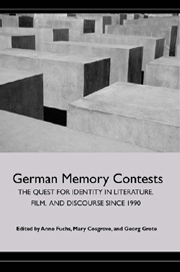Book contents
- Frontmatter
- Contents
- Acknowledgments
- Introduction: Germany's Memory Contests and the Management of the Past
- Positions
- Mediations
- Ethnicity/Hybridity
- 8 Imagined Identities: Children and Grandchildren of Holocaust Survivors in Literature
- 9 Of Stories and Histories: Golem Figures in Post-1989 German and Austrian Culture
- 10 Multi-Ethnicity and Cultural Identity: Afro-German Women Writers' Struggle for Identity in Postunification Germany
- Memory Politics
- Works Cited
- Notes on the Editors and Contributors
- Index
10 - Multi-Ethnicity and Cultural Identity: Afro-German Women Writers' Struggle for Identity in Postunification Germany
from Ethnicity/Hybridity
Published online by Cambridge University Press: 05 February 2013
- Frontmatter
- Contents
- Acknowledgments
- Introduction: Germany's Memory Contests and the Management of the Past
- Positions
- Mediations
- Ethnicity/Hybridity
- 8 Imagined Identities: Children and Grandchildren of Holocaust Survivors in Literature
- 9 Of Stories and Histories: Golem Figures in Post-1989 German and Austrian Culture
- 10 Multi-Ethnicity and Cultural Identity: Afro-German Women Writers' Struggle for Identity in Postunification Germany
- Memory Politics
- Works Cited
- Notes on the Editors and Contributors
- Index
Summary
German unification brought for Afro-Germans, as well as for African and other non-white immigrants and asylum seekers, an increased feeling of vulnerability and not belonging. As Marilyn Sephocle observes: “Before German unification African Germans had to grapple with identity/image issues. Today their focus is on something even more pressing: fear of being attacked.” In the following, I will focus in particular on texts by May Ayim, Helga Emde, and Ika Hügel-Marshall, who played an important role in founding the Afro-German group. Theirs are strong voices against the increase in racist violence in the immediate postunification years. In their postunification texts, these and other Afro-German women writers contest the euphoric memories of unification. Their texts shed light on their efforts to build a community, define their biracial identities, and understand their heritage: theirs is a “struggle for cultural space in the New Germany.” By fighting against racism and reclaiming their erased history in Germany they contest notions of a monoethnic German society, what Helga Emde calls “the myth of Germanic ethnic-nationalism.”
Like most Germans with biracial African or African American and German heritage, Ayim, Emde, and Hügel-Marshall grew up isolated from other black people in a predominantly white society that marginalized them. Only in the mid-1980s did Afro-Germans begin to define themselves as a cultural group. In 1984, the American black activist poet Audre Lorde taught a course on black American women poets at the Free University in Berlin where she got to know black German women.
- Type
- Chapter
- Information
- German Memory ContestsThe Quest for Identity in Literature, Film, and Discourse since 1990, pp. 209 - 226Publisher: Boydell & BrewerPrint publication year: 2006

